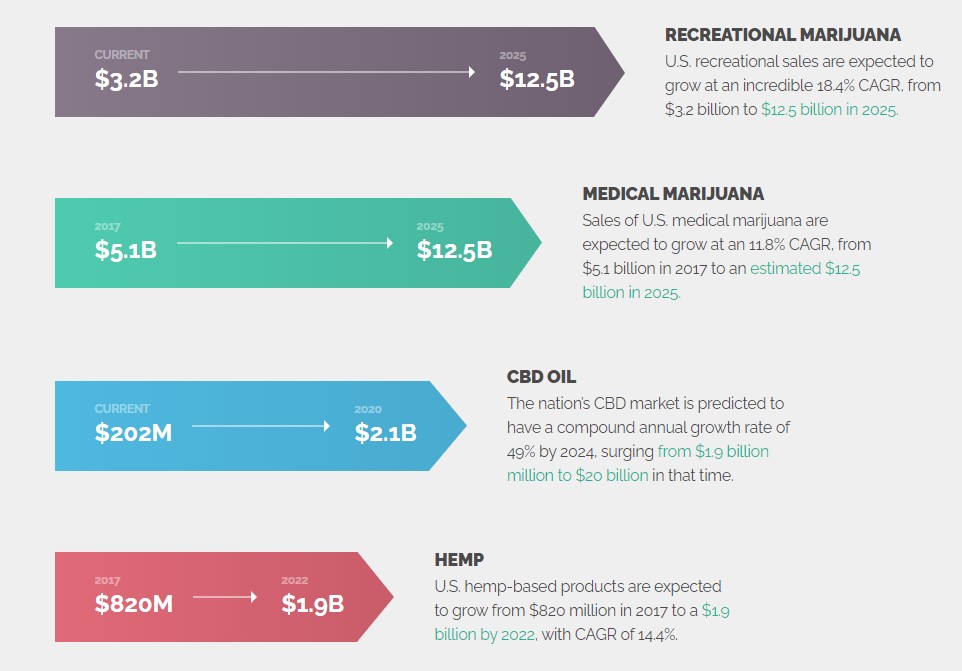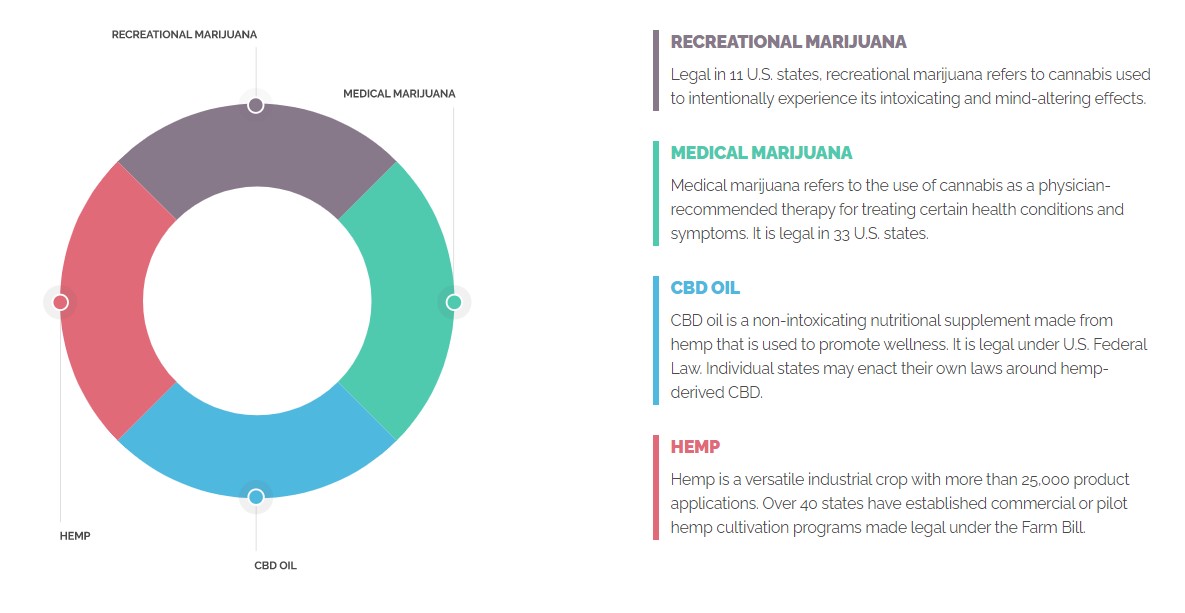Introduction
The American Cannabis Company (ACC) is an all-embracing consulting management organization for the cannabis industry. ACC was founded and launched in 2013, with a mission to help society reconsider their thoughts on cannabis through their organization. ACC aims to regulate and grow cannabis growth opportunities. The ACC offers construction management, facility design, and operation deployment services. All of this helps business owners build functional and sustainable operations in order to meet their market demands. The ACC is a consulting firm that helps cannabis businesses to grow and develop whilst following regulations and laws.
Industry information
The cannabis industry is the legal cultivation, production, sales, and research or any other activities around cannabis or its industrial alternative, hemp. Marijuana has been the most commonly used, cultivated, and trafficked drug, which has led some jurisdictions attempt to legalize it, regulate the industry, and benefit economically (sales and taxes going into the legal economy not the black market). The industry is currently estimated at $13.6 billion with a creation of 340,000 jobs in 2019 (Dsouza, 2020).
Due to the rapid acceptance of the legal cannabis industry by states and investors, with more than half of Americans believing the drug should be legalized – the industry is expected to reach $30 billion annually by 2025 (Uzialko, 2020). The cannabis industry can be broken down into 5 distinct segments, but many companies may choose to engage in several as they vertically integrate. These include:
- Breeders – comparable to research and development, breeders focus on proliferation of existing strains and creation of new strains of cannabis through selective breeding. Breeders develop seeds used by cultivators and identify the best genetic strains of plants.
- Cultivators – management of large growing facilities where cannabis is grown at scale from seeds. They engage in cultivation methods for the plants to grow healthy and high quality in order to meet regulatory requirements and then harvest them as well.
- Manufacturers – also known as extractors, process the harvested cannabis into finished products such as concentrated extracts, topicals, edibles or other medical or recreational consumer products.
- Dispensaries – the distribution hubs of the cannabis industry, comparable to retail stores. These sell to individual consumers and must meet a wide range of regulatory requirements to ensure legality of the operations.
- Transportation and logistics – despite being commonly overlooked, transportation is vital for the cannabis industry to transport cannabis plants to manufacturers and products to consumers. Due to the nature of the product and transportation that may involve crossing state lines, logistics for the cannabis industry may require greater regulation (Uzialko, 2020).


In the United States, marijuana is classified as a Schedule I drug and is illegal under federal law. However, as of November 2020, 35 states and Washington D.C. have legalized marijuana for medical use, 15 of which allow purchasing by adults for recreational use. The biggest challenge is the contradiction between federal and state law, creating unique legal scenarios and it becomes unclear which has precedence. Another challenge is the social aspect, with large portions of the population, government, and law enforcement believing the drug to be a public safety concern.
It is supported by research data to an extent suggesting the legalization of marijuana which makes access to it much easier has public health effects (marijuana-related poisonings, traffic fatalities, minor use) as well as actually increasing the presence of the black market and criminal groups since unofficially marijuana is much cheaper in comparison to tax-levied legal industry (Evans, 2019). Public perception has been shifting to becoming more accepting of marijuana use, thus the widespread decriminalization across the US, but it remains a drug with a highly contentious reputation. The incoming Biden presidential administration has openly voiced support for decriminalization of marijuana suggesting the industry will face significantly less risk going forward.
Benefits of cannabis
Certain cannabis products and by-products have been shown to have some medical or sensory benefits. Cannabis contains the chemical CBD which impacts the brain function along with THC that has pain relieving properties. The majority of cannabis products are targeted at relieving pain, notably beneficial to those experiencing chronic pain. It can also aid in managing side of effects of diseases and treatments, such as many cancer patients utilize cannabis to manage chemotherapy side-effects, while CBD has been linked to positive effects of regulation seizures in individuals with epilepsy.
Cannabis has been associated with benefits in mental health such as individuals with ADHD that struggle with focus and cognitive performance experience much better concentration. Cannabis is used commonly in treatment of depression and anxiety when taken in proper doses, helping to alleviate the symptoms, particularly for those with heavy forms such as PTSD victims. Other medical conditions such as glaucoma, diabetes, arthritis, or Alzheimer’s disease may benefit from the effects of cannabis as well (Health Europa, 2019).
About American cannabis company and company history
The ACC began as an end-to-end provider of consulting solutions for the cannabis industry. Its initial work began in 2009 as it consulted and cooperated with engineers to design and build large indoor cannabis cultivation facilities in Colorado. It works with companies to secure cannabis licenses in the United States and internationally. In 2013, the ACC pivoted its brand to become a vertically integrated, multi-state operator.
Therefore, the company offers consulting, licensing, and management services (described in the next section) as well as operates its own facilities and dispensaries under its brand name. A large element of its current operations is focused on equity investments and partnerships to expand the brand visibility in the industry through opening more locations as a multi-state operator. ACC approaches the cannabis industry almost as a technology firm, continuously seeking to innovate its service offerings and product to remain efficient and relevant in the sector (American Cannabis Company, n.d.a).
Services offered
The ACC offers a wide variety of services. It offers pre-licensing services focused on strategic planning, business planning; state licensing application assistance, and post-licensing consulting (facility buildout, staffing, roll-out). As part of its consulting services, it offers a la carte service-based solutions for operations and start-up project. It also offers operational management services such on-site and remote management for cannabis retail, cultivation, and processing businesses.
The company has primarily worked with cultivators and manufacturing, helping to build large facilities. However, ACC also works with retail dispensing as part of its ACC brand licensing. The company offers the ability to partner with ACC using its branding on a retail dispensary location, while the company provides back-end operations and potentially sources product. ACC also seeks to expand nationally so it does pursue acquisition and investment in smaller cannabis operators (American Cannabis Company, n.d.b).
Marketing Mix
From research, it seems that the primary marketing efforts of ACC is concentrated mostly on social media and cannabis industry-associated websites. The company does have a dedicated sales and marketing team, recently hiring a high-profile marketing executive to join its ranks. From public statements, it seems that the company does not necessarily run many marketing initiatives but focuses on sales, partnerships, and brand recognition in the industry, building its marketing potential through that route rather than direct advertisement (Invest in Weed, 2019).
- Product: primarily consulting and licensing services, brand name cannabis cultivation products wholesale.
- Price: price for either its services or products unavailable anywhere, seems that the company works individually with clients based on their respective needs and scale of project.
- Place: sells online and has a physical office located in Denver, Colorado. The initial contact with consumer occurs online after which the direct contact occurs to determine further details.
- Promotion: detailed website, social media promotions, industry-specific promotion online and other media, search engines, targeted ads.
SWOT Analysis
Competitive Analysis
The cannabis sector is complex but can be split into cannabis products, cannabis services, cannabis production, and the financial/business elements of the industry. Although cannabis consulting is seen as a greenfield opportunity, there is a significant competition. There are cannabis consulting companies with better experience and larger in size, targeting anything from mass production of cannabis to craft cannabis and demographic minorities in the business (Bobrow, 2020). Since Colorado, Washington, and California are the industry leaders in cannabis due to early legalization, the majority of companies are concentrated in the Western US, making the region where ACC operates even more competitive. Furthermore, a large number of traditional business consulting companies and financial institutions have begun on working in the sector as cannabis adoption expands, offering consulting services when necessary.
Student Processed Improvements
After consideration of the information about the company, the primary improvements that are proposed for the ACC are to improve its marketing practices and streamline its operational focus. Currently marketing by the company is lackluster, focused on a minor social media presence alongside some niche domains. It uses typical business tool analytics such as being top search in Google for its name and location. However, outside of this there does not seem to be any recognizable marketing efforts or campaigns. Even its professionally constructed website lacks much detail regarding specifics such as pricing, which does not contribute well to the overall marketing mix of the company. Finally, it is suggested that the company narrow its focus.
While understandably it has a wide range of experience in the cannabis business, it seems to focus on consulting, selling its own cultivation technological products, as well as attempting to franchise its brand. The company is evidently large enough as to even be traded on the penny stock exchange. However, these wide engagement may create too diverse of services or potentially create conflicts of interest. Streamlining its operations may provide better resource allocation towards innovation and the segment of consulting where ACC excels.
Conclusion
The American Cannabis Company (ACC) is an innovative consulting service business in the cannabis industry. The cannabis sector is a rapidly growing industry due to higher public acceptance and decriminalization of cannabis in multiple jurisdictions. The drug has shown to have multiple medical uses and benefits and is consistently used for recreational purposes.
The ACC takes on a unique approach of helping new businesses obtain licenses and consult them on their strategic plans going forward, ranging from cultivation and manufacturing to retail. The company has significant experience in creating large cultivation facilities as well as sells both commercial and mass production goods for cannabis cultivation. ACC also offers partnerships and franchises its brand to retail. Overall, the company is attempting to establish itself as an innovative leader in the industry with a highly recognizable brand to ensure that legal cannabis becomes a solid business and financial investment.
references
American Cannabis Company. (n.d.a). History. Web.
American Cannabis Company. (n.d.b). Services. Web.
Bobrow, W. (2020). The top 5 cannabis industry consults you need to know. Forbes. Web.
Dsouza, D. (2020). The future of the marijuana industry in America. Web.
Evans D. G. (2019). Marijuana legalization will cause many problems for Missouri Law enforcement and schools. Missouri medicine, 116(3), 164–167.
Health Europa. (2019). 20 Health benefits of cannabis that everyone should know. Web.
Invest in Weed. (2019). American Cannabis Company, Inc. strengthens team by adding new VP of sales & marketing. Web.
Medical Marijuana Inc. (n.d.). Industry overview. Web.
Uzialko, A. (2020). Cannabis industry growth potential for 2021. Business Daily. Web.
Research process
EBSCO search
American Cannabis Company- Article 2 of 105.
American Cannabis company and Marijuana cultivation- 1 result but not similarity to my current article.
American Cannabis Company and Colorado- 1-4 articles 1 article appeared but its been already listed above.
American Cannabis company and medical- articles 1-15. Article was somewhat helpful but unrelated to topic.
American Cannabis company and medical marijuana- 1-8 articles but unrelated to topic.
American Cannabis Company and marketing- 1-1 Articles, unrelated and not much information.

